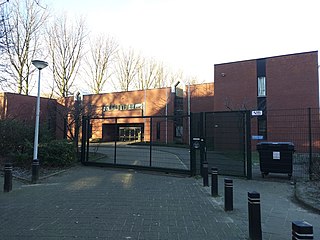
Baarn is a municipality and a town in the Netherlands, near Hilversum in the province of Utrecht.

Islam is the second largest religion in the Netherlands, after Christianity, and is practised by 5% of the population according to 2018 estimates. The majority of Muslims in the Netherlands belong to the Sunni denomination. Many reside in the country's four major cities: Amsterdam, Rotterdam, The Hague and Utrecht.

The Somali Football Federation (SFF) (:اتحاد الصومال لكرة القدم, was founded in 1951, and it is one of the national administrative governing bodies of the Confederation of African Football responsible for organizing and controlling the sport of football and its competitions in the Federal Republic of Somalia, they also manage the Somalia national football team. In 1962, the SFF became a FIFA member. It later joined CAF in 1968, and the Union of Arab Football Associations in 1974. The SFF is responsible for organizing matches between local teams and enforcing rules and regulations of the game during matches.

The Somali diaspora or Qurbajoogta refers to Somalis who were born in Greater Somalia and reside in areas of the world that they were not born in. The civil war in Somalia greatly increased the size of the Somali diaspora, as many Somalis moved from Greater Somalia primarily to Europe, North America, Southern Africa and Australia. There are also small Somali populations in other pockets of Europe and Asia. The UN estimates that in 2015, approximately 2 million people from Somalia were living outside of the country's borders.
Turks in the Netherlands refers to people of full or partial Turkish ethnicity living in the Netherlands. They form the largest ethnic minority group in the country; thus, the Turks are the second-largest ethnic group in the Netherlands after the ethnic Dutch. The majority of Dutch Turks descend from the Republic of Turkey; however, there has also been significant Turkish migration waves from other post-Ottoman countries including ethnic Turkish communities which have come to the Netherlands from the Balkans, the island of Cyprus, as well as from other parts of the Levant. More recently, during the European migrant crisis significant waves of Turkish minorities from Syria and Kosovo have also arrived in the Netherlands. In addition, there has been migration to the Netherlands from the Turkish diaspora; many Turkish-Belgians and Turkish-Germans have arrived in the country as Belgian and German citizens.
Cape Verdeans in the Netherlands consist of migrants from Cape Verde to the Netherlands and their descendants. As of 2022, figures from Statistics Netherlands showed 23,150 people of Cape Verdean origin in the Netherlands.

Somalia first participated at the Olympic Games at the 1972 Summer Games in Munich, West Germany; the Somali Olympic Committee being recognised by the International Olympic Committee shortly prior. The nation has sent athletes to compete in most Summer Olympic Games since then, boycotting in 1976 due to the inclusion of New Zealand, and in 1980 when it joined with the American-led boycott. It also did not compete in 1992 due to the ongoing effects of a famine. Somalia entered their largest contingent of athletes at the 1984 Summer Olympics, a total of seven.
Moroccans in the Netherlands are Dutch citizens of Moroccan origin. They consist of immigrants from Morocco and their descendants, and form the second largest ethnic group in the Netherlands.

Japanese people in the Netherlands include expatriates from Japan and their descendants, as well as Dutch citizens of Japanese ancestry.
Koreans in the Netherlands form one of the smaller Korean diaspora groups in Europe. As of 2022, 9,469 people of Korean origin lived in the Netherlands.
Chinese people in the Netherlands form one of the largest overseas Chinese populations in continental Europe. In 2018 official statistics showed 92,644 people originating from the People's Republic of China (PRC) and Republic of China (ROC), or people with at least one such parent. However, these statistics do not capture the whole size of the Chinese community, which since its earliest days has included not just migrants from China, but people of Chinese ethnicity drawn from among overseas Chinese communities as well.
Vietnamese people in the Netherlands form one of the smaller overseas Vietnamese communities of Europe. They consist largely of refugees from the former South Vietnam, Vietnamese born-citizens and their descendants.
Iranians in the Netherlands form one of the newer and larger populations of the Iranian diaspora in Europe. Iranians in the Netherlands are referred to by hyphenated terms such as Dutch-Iranians, Iranian-Dutch, Dutch-Persian, or Persian-Dutch. Similar terms Iraanse Nederlanders, Nederlandse Iraniërs, and Perzische-Nederlanders may be found in Dutch-language media.
Dutch Afghans are Dutch citizens and non-citizen residents born in, or with ancestors from, Afghanistan. In 2015 there were 44,000 Dutch Afghans, which form one of the largest Afghan diaspora communities as well as one of the main Asian communities in the Netherlands. Most of the first generation population originally settled in the Netherlands between 1992 and 2001.
There is a small population of Angolans in the Netherlands numbering around 10,000 people, largely consisting of refugees from the Angolan Civil War.

There is a small community of Nigerians in the Netherlands, which began to grow in the late 1980s.
Events in the year 2020 in Somalia.







